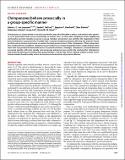Chimpanzees behave prosocially in a group-specific manner
Abstract
Chimpanzees act cooperatively in the wild, but whether they afford benefits to others, and whether their tendency to act prosocially varies across communities, is unclear. Here, we show that chimpanzees from neighboring communities provide valuable resources to group members at personal cost, and that the magnitude of their prosocial behavior is group specific. Provided with a resource-donation experiment allowing free (partner) choice, we observed an increase in prosocial acts across the study period in most of the chimpanzees. When group members could profit (test condition), chimpanzees provided resources more frequently and for longer durations than when their acts produced inaccessible resources (control condition). Strikingly, chimpanzees’ prosocial behavior was group specific, with more socially tolerant groups acting more prosocially. We conclude that chimpanzees may purposely behave prosocially toward group members, and that the notion of group-specific sociality in nonhuman animals should crucially inform discussions on the evolution of prosocial behavior.
Citation
van Leeuwen , E J C , DeTroy , S E , Kaufhold , S P , Dubois , C , Schütte , S , Call , J & Haun , D B M 2021 , ' Chimpanzees behave prosocially in a group-specific manner ' , Science Advances , vol. 7 , no. 9 , eabc7982 . https://doi.org/10.1126/sciadv.abc7982
Publication
Science Advances
Status
Peer reviewed
ISSN
2375-2548Type
Journal article
Description
Funding: EJCvL was funded by a Postdoctoral Fellowship awarded by the Research Foundation Flanders (FWO) and an ERC-Synergy Grant (no. 609819) awarded to JC.Collections
Items in the St Andrews Research Repository are protected by copyright, with all rights reserved, unless otherwise indicated.

